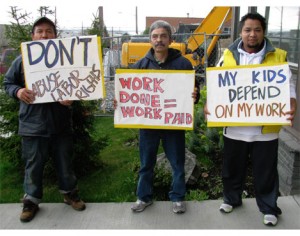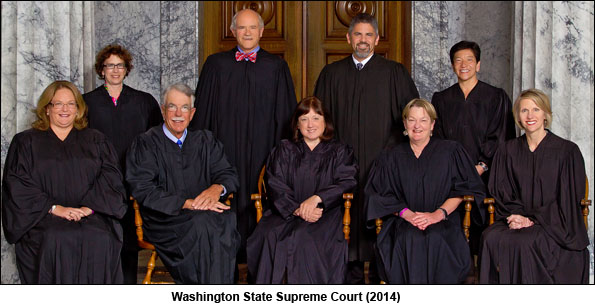LOCAL
Major court win for subcontractors’ workers
By HILARY STERN
Special to The Stand
 OLYMPIA (Aug. 14, 2014) — Beginning in 2007, Orlando Ventura Reyes went to work every night — scheduled for 364 days a year — at a Puget Sound-area Fred Meyer store. He says he made less than the minimum wage, was not paid overtime, and had to find and pay his own replacement if he was sick.
OLYMPIA (Aug. 14, 2014) — Beginning in 2007, Orlando Ventura Reyes went to work every night — scheduled for 364 days a year — at a Puget Sound-area Fred Meyer store. He says he made less than the minimum wage, was not paid overtime, and had to find and pay his own replacement if he was sick.
Last week, the Washington State Supreme Court made it a little easier for Ventura Reyes to get some justice. The court unanimously decided on Aug. 7 that Fred Meyer could be liable, through two sets of subcontractors, to janitors who weren’t paid overtime under the state minimum wage law.
“The Supreme Court’s opinion is a great victory not only for these janitors but for other workers who are exploited by subcontractors,” said David Mark, attorney for the janitors.
Fred Meyer used to hire unionized janitors. But in 2004 it started to outsource its janitorial work to a national company based in Tennessee, which in turn contracted with small local companies to clean the Fred Meyer stores. Fred Meyer then claimed that it had no responsibility to make sure that the janitors working at its stores every night were getting paid minimum wage and that the companies hiring them paid the proper payroll taxes and insurance premiums. A King County court sided with Fred Meyer.
However, the State Supreme Court disagreed.
Writing the Becerra Becerra v. Expert Janitorial, LLC decision for the court, Justice Steve Gonzalez said that in these cases, courts can consider a variety of factors when determining joint employment such as whether the company at the top knew of wage-and-hour violations, whether it paid sufficient amounts to the subcontractor to allow for a lawful wage, and whether the subcontracting arrangement is a “subterfuge or sham.”
Ventura Reyes has been fighting for a long time to get paid the money that he was owed. In January 2010, he and other janitors working at Fred Meyer went to Casa Latina, a Seattle worker center, to meet with the organization’s worker defense committee, a committee of low-wage immigrant workers that meets weekly to help each other fight wage theft cases.
Cariño Barragán Talancón, the Casa Latina organizer who staffs the committee, quickly realized that the janitors’ cases could be taken to court.

(From left) Armando Arredondo, Hector Martinez and Noe Montes of the Workers defense Committee at Casa Latina.
Although their immediate employer was a small company that would surely declare bankruptcy if sued, that company was hired by a national janitorial company, Expert Janitorial of Tennessee, which in turn was contracted by Fred Meyer to clean 40 of its stores. If an attorney could prove “joint employment,” the janitors had a chance of getting paid a settlement.
Even though they received a favorable decision from the Washington State Supreme Court, the janitors’ case is far from over. Now they must go back to the trial court to decide the case.
“My clients and I look forward to returning to the trial court and introducing evidence that Fred Meyer and Expert Janitorial created a system under which these gross abuses of janitors was a natural consequence,” Mark said.
“Workers, of course, want to get their money back,” said Barragán Talancón, “but they tell us that it is even more important to stop that boss from exploiting more workers. Because of the decision of the Supreme Court, we are one step closer to stopping wage theft in Washington State.”
The author of this report, Hilary Stern, is Executive Director of Casa Latina.






